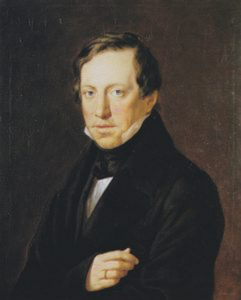The young lad and death
(Poet's title: Der Jüngling und der Tod)
Set by Schubert:
D 545
[March 1817]
Der Jüngling
Die Sonne sinkt, o könnt’ ich mit ihr scheiden!
Mit ihrem letzten Strahl entfliehen!
Ach diese namenlosen Qualen meiden
Und weit in schön’re Welten ziehn.
O komme, Tod, und löse diese Bande!
Ich lächle dir, o Knochenmann,
Entführe mich leicht in geträumte Lande,
O komm und rühre mich doch an.
Der Tod
Es ruht sich kühl und sanft in meinem Armen,
Du rufst! Ich will mich deiner Qual erbarmen.
The young lad:
The sun is setting, oh, if only I could depart along with it!
If only I could fly off with its final ray!
Oh, to avoid these nameless torments
And head off into more beautiful worlds.
Oh come, death, and release these ties!
I smile at you, you skeleton,
Lead me gently into the land of my dreams,
Oh come and do bother me.
Death:
There is cool and gentle rest in my arms,
You are calling! I shall soothe your torment.
All translations into English that appear on this website, unless otherwise stated, are by Malcolm Wren. You are free to use them on condition that you acknowledge Malcolm Wren as the translator and schubertsong.uk as the source. Unless otherwise stated, the comments and essays that appear after the texts and translations are by Malcolm Wren and are © Copyright.
☙
Themes and images in this text:
Arms and embracing Bones and skeletons Dreams Evening and the setting sun Journeys Knots and bonds Leading and directing Names Near and far Pain Rays of light Rest
It did not take long for some of Schubert’s songs to become remarkably popular with his friends. Within a matter of weeks (or possibly even a few days) there must have been so much enthusiasm about ‘Der Tod und das Mädchen‘ (D 531) that some friends were demanding that Schubert compose a companion. What if it is a boy not a girl that is speaking? What if Death is not approaching but needs to be summoned? What if the person who is speaking is not reluctant to die? We can imagine almanacs and poetry collections being rifled but nothing suitable appears to have presented itself. In the end it was left to Josef von Spaun (no poet) to cobble together some words for Schubert to set to music.
Spaun takes the basic format of Claudius’s Der Tod und das Mädchen and refers to one specific line at the end of the girl’s speech: ‘rühre mich nicht an’ (do not bother me / do not disturb me). Spaun’s young lad feels differently. He has been longing for death and for him it cannot come soon enough, so his words are ‘rühre mich doch an’ (do bother me / feel free to disturb me). We are not told why he is so keen to die. He refers to ‘namenlose Qualen’ (nameless torments), but that is not very informative. He says that he feels bound or tied, and he wants death to unbind him or to release his chains. Whatever his condition was, it is worth remembering that he lived in a culture where suicide was considered (and widely spoken of) as both a criminal and a sinful act. Death could be longed for and welcomed when it approached, but it could not be invited directly.
☙
Original Spelling Der Jüngling und der Tod Der Jüngling Die Sonne sinkt, o könnt' ich mit ihr scheiden! Mit ihrem letzten Strahl entfliehen! Ach diese namenlosen Qualen meiden Und weit in schön're Welten zieh'n. O komme, Tod, und löse diese Bande! Ich lächle dir, o Knochenmann, Entführe mich leicht in geträumte Lande, O komm' und rühre mich doch an. Der Tod Es ruht sich kühl und sanft in meinem Armen, Du rufst! Ich will mich deiner Qual erbarmen.
Schubert received this text, which is Josef von Spaun’s response to Schubert’s “Der Tod und das Mädchen” (D. 531), in manuscript form; his manuscript has not been preserved.


